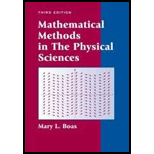
Solve the following differential equations by the method of Frobenius (generalized power series). Remember that the point of doing these problems is to learn about the method (which we will use later), not just to find a solution. You may recognize some series [as we did in ( 11.6)] or you can check your series by expanding a computer answer.
Want to see the full answer?
Check out a sample textbook solution
Chapter 12 Solutions
Mathematical Methods in the Physical Sciences
Additional Math Textbook Solutions
College Algebra (7th Edition)
Intro Stats, Books a la Carte Edition (5th Edition)
A Problem Solving Approach To Mathematics For Elementary School Teachers (13th Edition)
Elementary Statistics (13th Edition)
Elementary Statistics: Picturing the World (7th Edition)
- 1) Compute the inverse of the following matrix. 0 1 1 A = 5 1 -1 2-3 -3arrow_forwardQuestion 3 (5pt): A chemical reaction. In an elementary chemical reaction, single molecules of two reactants A and B form a molecule of the product C : ABC. The law of mass action states that the rate of reaction is proportional to the product of the concentrations of A and B: d[C] dt = k[A][B] (where k is a constant positive number). Thus, if the initial concentrations are [A] = = a moles/L and [B] = b moles/L we write x = [C], then we have (E): dx dt = k(ax)(b-x) 1 (a) Write the differential equation (E) with separate variables, i.e. of the form f(x)dx = g(t)dt. (b) Assume first that a b. Show that 1 1 1 1 = (a - x) (b - x) - a) a - x b - x b) (c) Find an antiderivative for the function f(x) = (a-x) (b-x) using the previous question. (d) Solve the differentiel equation (E), i.e. find x as a function of t. Use the fact that the initial concentration of C is 0. (e) Now assume that a = b. Find x(t) assuming that a = b. How does this expression for x(t) simplify if it is known that [C] =…arrow_forward2) Consider the matrix M = [1 2 3 4 5 0 2 3 4 5 00345 0 0 0 4 5 0 0 0 0 5 Determine whether the following statements are True or False. A) M is invertible. B) If R5 and Mx = x, then x = 0. C) The last row of M² is [0 0 0 0 25]. D) M can be transformed into the 5 × 5 identity matrix by a sequence of elementary row operations. E) det (M) 120 =arrow_forward
- 3) Find an equation of the plane containing (0,0,0) and perpendicular to the line of intersection of the planes x + y + z = 3 and x y + z = 5. -arrow_forward3) Find the volume of the solid that lies inside both the sphere x² + y² + z² cylinder x²+y² = 1. = 4 and thearrow_forward1) In the xy-plane, what type of conic section is given by the equation - √√√(x − 1)² + (y − 1)² + √√√(x + 1)² + (y + 1)² : - = 3?arrow_forward
- 1) Compute the following limit. lim x-0 2 cos(x) 2x² - x4arrow_forward3) Let V be the vector space of all functions f: RR. Prove that each W below is a subspace of V. A) W={f|f(1) = 0} B) W = {f|f(1) = ƒ(3)} C) W={ff(x) = − f(x)}arrow_forwardTranslate the angument into symbole from Then determine whether the argument is valid or Invalid. You may use a truth table of, it applicable compare the argument’s symbolic form to a standard valid or invalid form. pot out of bed. The morning I did not get out of bed This moring Mat woke up. (1) Cidt the icon to view tables of standard vald and braild forms of arguments. Let prepresent."The morning Must woke up "and let a represent “This morning I got out of bed.” Seled the cared choice below and II in the answer ber with the symbolic form of the argument (Type the terms of your expression in the same order as they appear in the original expression) A. The argument is valid In symbolic form the argument is $\square $ B. The angunent is braid In symbolic form the argument is $\square $arrow_forward
- Ms.sally has 12 studentsMr Franklin has twice as many students as Ms. Sally.how many students does Mr Franklin have?arrow_forwardexplainwhat is means for a shape to be symmetricarrow_forwardy = f(x) b C The graph of y = f(x) is shown in the figure above. On which of the following intervals are dy > 0 and dx d²y dx2 <0? I. aarrow_forwardarrow_back_iosSEE MORE QUESTIONSarrow_forward_ios
- Algebra & Trigonometry with Analytic GeometryAlgebraISBN:9781133382119Author:SwokowskiPublisher:Cengage
